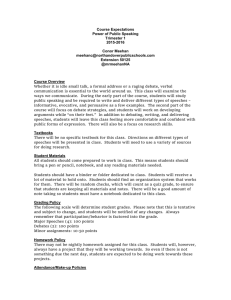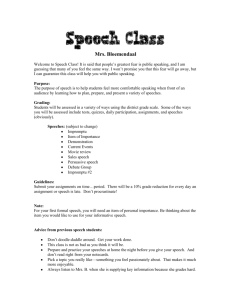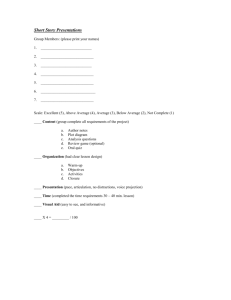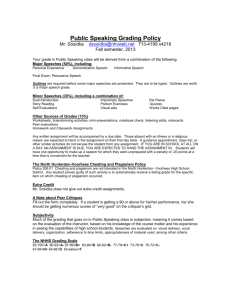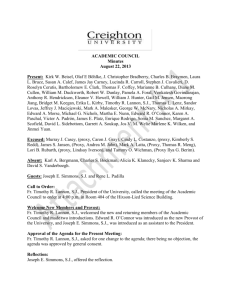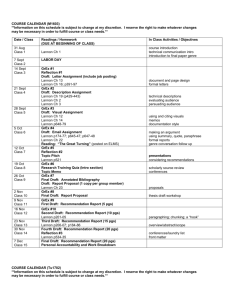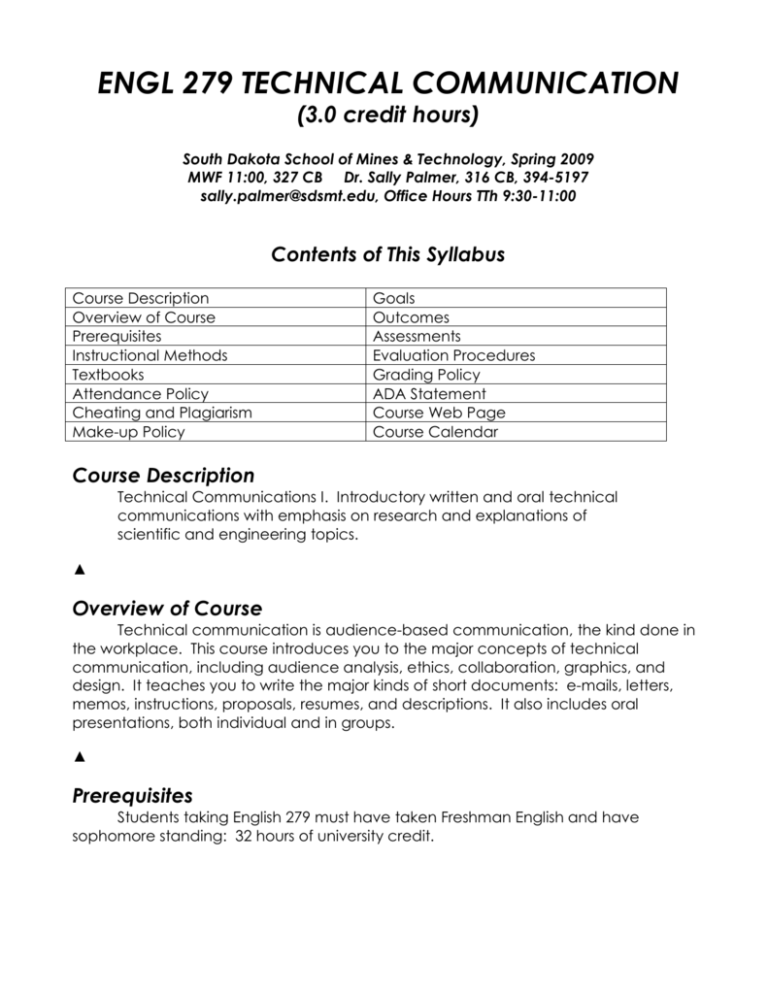
ENGL 279 TECHNICAL COMMUNICATION
(3.0 credit hours)
South Dakota School of Mines & Technology, Spring 2009
MWF 11:00, 327 CB Dr. Sally Palmer, 316 CB, 394-5197
sally.palmer@sdsmt.edu, Office Hours TTh 9:30-11:00
Contents of This Syllabus
Course Description
Overview of Course
Prerequisites
Instructional Methods
Textbooks
Attendance Policy
Cheating and Plagiarism
Make-up Policy
Goals
Outcomes
Assessments
Evaluation Procedures
Grading Policy
ADA Statement
Course Web Page
Course Calendar
Course Description
Technical Communications I. Introductory written and oral technical
communications with emphasis on research and explanations of
scientific and engineering topics.
▲
Overview of Course
Technical communication is audience-based communication, the kind done in
the workplace. This course introduces you to the major concepts of technical
communication, including audience analysis, ethics, collaboration, graphics, and
design. It teaches you to write the major kinds of short documents: e-mails, letters,
memos, instructions, proposals, resumes, and descriptions. It also includes oral
presentations, both individual and in groups.
▲
Prerequisites
Students taking English 279 must have taken Freshman English and have
sophomore standing: 32 hours of university credit.
Instructional Methods
English 279 is taught with lecture, class discussion, group activities, video
presentations, and student-led instruction. ▲
Textbook
Required: Lannon, John M., Technical Communication, 11th Edition. New York:
Pearson Longman, 2008.
▲
Attendance Policy
Attendance is required and will be taken each class period. If you miss a class,
you are expected to stay current with what we did by getting in touch with another
student or the instructor. Each absence, whether excused or not, will cost you 3 points
out of the 100 allotted for attendance. If you know you will have to miss class, try to
contact me beforehand.
▲
Cheating and Plagiarism
Don't even think about it! Plagiarism is grounds for failing the course. We will
discuss ethics and research standards in the course. If you have trouble understanding
what constitutes plagiarism, please ask the instructor for clarification. Those using their
computers to cheat are subject to a range of consequences that includes expulsion
from the university.
▲
Makeup Policy
Quizzes may be made up beforehand for excused absences. If you know you
will be absent, ask to take the quiz early. Speeches cannot be made up after the
allotted performance date.
▲
Goals
This course addresses the following System General Education goals:
1. Students will write effectively and responsibly and will understand and interpret
the written expression of others.
2. Students will communicate effectively and responsibly through listening and
speaking.
▲
Outcomes
Goal 1:
As a result of taking English 279, students will:
1. Write using standard American English, including correct punctuation,
grammar, and sentence structure;
2. Write logically;
3. Write persuasively, with a variety of rhetorical strategies.
4. Incorporate formal research and documentation into their writing, including
research obtained through modern, technology-based research tools.
Goal 2:
As a result of taking English 279, students will:
1. Prepare and deliver speeches for a variety of audiences and settings;
2. Demonstrate speaking competencies including choice and use of topic,
supporting materials, organizational pattern, language usage,
presentational aids, and delivery;
3. Demonstrate listening competencies by summarizing, analyzing, and
paraphrasing ideas, perspectives and emotional content.
▲
Assessments
Goal 1:
For Outcome #1
Students will use standard American English and correct grammar,
punctuation, and mechanics in written assignments.
For Outcome #2
Students will produce well-organized and effectively designed
short, basic technical documents.
For Outcome #3
Students will produce individual and collaborative documents for
a variety of technical, professional, and general audiences.
Students will recognize and use appropriate conventional formats
and visuals for a variety of basic technical/professional documents.
Students will practice a persuasive technical communication
style based on conciseness, clarity, and fluency, using a variety of
strategies, in written assignments.
For Outcome #4
Students will use the basic research skills and documentation
techniques necessary to produce effective written technical
communications.
Students will exhibit awareness of ethical standards by accurately
using sources and formulating text in their papers.
Goal 2:
For Outcome #1
Students will prepare and deliver speeches of differing lengths,
topics, and purposes to large and small groups.
For Outcome #2
Students will demonstrate their competency in topic choice,
materials selection, organization, language, presentational aids,
and delivery, in individual and collaborative speeches both
prepared and extemporaneous.
For Outcome #3
Students will demonstrate listening competencies by summarizing,
analyzing, and paraphrasing content from audiovisual
presentations in written assignments.
▲
Evaluation Procedures
The following written assignments count for 60% of your grade:
memoranda, both e-mail and written 15%
summary 10%
resume folder 15%
instructions 10%
quizzes 10%
The following speech assignments count for 30% of your grade:
introductory speech 10%
informative speech 10%
group instructional speech 10%
The following counts for 10% of your grade:
attendance, participation, preparation, and professionalism
▲
Grading Policy
Assignments are graded for clarity, accuracy, neatness/attractiveness, organization,
completeness, and conciseness. Your assignments will receive a percentage score.
At the end of the semester, those numbers will be crunched according to the formula
above and grades will be assigned as follows: A=90% and above, B=82% and above,
C=74% and above, D=66% and above, F=65% and below.
Late assignments are accepted but will be penalized 10%.
▲
ADA and Academic Freedom Statements
Students with special needs or who require special accommodations should contact
Dr. Sally Palmer, at 394-5197, and/or the campus ADA coordinator, Jolie McCoy, 3941924, at the earliest opportunity.
Freedom in learning. Students are responsible for learning the content of any course of study in
which they are enrolled. Under Board of Regents and University policy, student academic
performance shall be evaluated solely on an academic basis and students should be free to take
reasoned exception to the data or views offered in any course of study. Students who believe that
an academic evaluation is unrelated to academic standards but is related instead to judgment of
their personal opinion or conduct should contact the dean of the college which offers the class to
initiate a review of the evaluation.
▲
Course Web Page
The course website, on which you may find this syllabus and copies of the assignments,
is located on D2L. Access the website at https://d2l.sdbor.edu/.
▲
Tentative Course Calendar
(any changes will be announced in class)
Week 1 (January 16):
Course Introduction: What is Technical Writing?
Week 2 (January 21, 23):
Ethics
Giving a Speech
Draw for speech order
*Read Lannon Chap. 26. Friday Quiz: Ch. 26
Week 3 (January 26, 28, 30):
Speech video
Speeches begin
Week 4 (February 2, 4, 6):
Email and Memos. Presentation video.
Draw for speech order: Informative speeches
*Read Chapter 16. Friday Quiz: Ch. 16
Week 5 (February 9, 11, 13):
Business Letters. Memo assignment due for peer review.
Using visual aids.
*Read Chapter 17. Friday Quiz: Chapter 17
Week 6 (February 18,10):
Group conferences for informative speeches.
Speeches begin
#Read
Week 7 (February 23, 25, 27):
Informative speeches.
Writing summaries.
Journal article memo due.
*Read Chapter 11. Friday Quiz: Chapter 11
Week 8 (March 16, 18, 20):
Summaries.
Writing instructions.
*Read Chapter 22. Friday Quiz: Ch. 22
Week 9 (March 23, 25):
Writing instructions, cont. Form presentation groups.
Week 10 (March 30, Apr 1):
Creating the Job Packet. Group practices as needed.
*Read Chapter 18. Wednesday Quiz: Ch. 18
Week 11 (April 6, 8):
Resume review. Job packet, cont. Group practices as needed.
Week 12 (April 15, 17):
Group instructional presentations on Lannon Ch. 20, 19.
*Read Chapters 20, 19. Quizzes: Ch. 20, 19.
Week 13 (April 20, 22, 24):
Group instructional presentations on Lannon Ch. 4, 5, 6.
*Read Chapters 4, 5, 6. Quizzes: Ch. 4, 5, 6.
Week 14 (April 27, 29, May 1):
Group instructional presentations on Lannon Ch. 12, 13, 15.
*Read Chapters 12, 13, 15. Quizzes: Ch.12, 13, 15.

